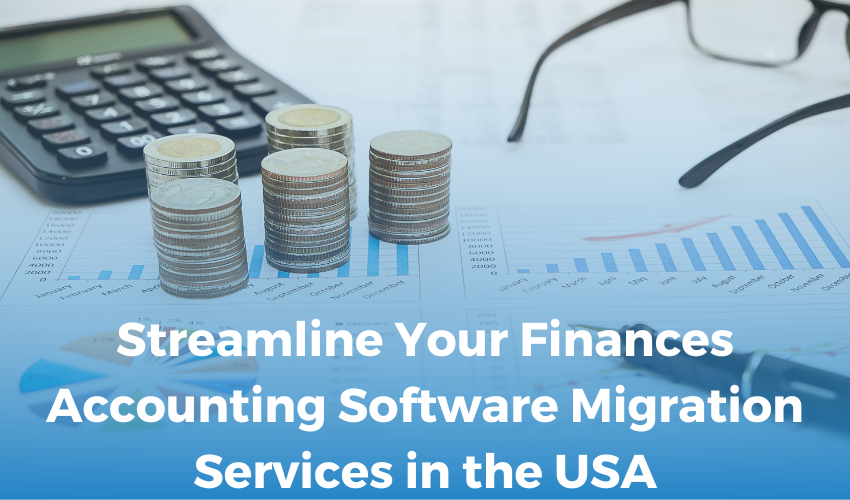

23-10-23
Accounting is the backbone of any successful business, ensuring financial data is tracked, analyzed, and reported accurately. In today’s fast-evolving financial landscape, outdated systems can hinder efficiency, accuracy, and compliance. This is where accounting software migration services come into play, offering businesses the opportunity to upgrade to modern, feature-rich accounting solutions. In this blog, we’ll explore the benefits of migrating to advanced accounting software and why it’s a vital step for businesses in the USA.
Accounting software migration refers to the process of transitioning financial data from an existing system to a newer, more efficient platform. This process is critical for businesses that aim to adopt advanced features such as automation, integration, real-time data access, and enhanced security. Modern accounting software solutions like QuickBooks, Xero, and Zoho Books provide powerful tools that streamline operations and ensure regulatory compliance.
Upgrading accounting software is not just about keeping up with technology—it’s about optimizing your business processes. Here are some key benefits:
1. Enhanced Efficiency
Modern accounting systems automate repetitive tasks, reducing manual data entry and minimizing errors. This frees up time for your team to focus on strategic activities that drive growth.
2. Real-Time Data Access
Cloud-based accounting software allows you to access financial data anytime, anywhere. This real-time visibility is essential for making informed decisions quickly and effectively.
3. Improved Accuracy
Automation in modern accounting systems significantly reduces human errors, ensuring reliable and accurate financial data for decision-making and reporting.
4. Cost Savings
By streamlining processes and automating tasks, businesses save on labor costs and avoid financial losses due to errors. Moreover, cloud-based solutions reduce the need for expensive hardware.
5. Better Integration
Advanced software can seamlessly integrate with other business tools, such as CRM systems, inventory management platforms, and payroll services, creating a unified and efficient workflow.
6. Robust Security
Data breaches can be disastrous for businesses. Modern accounting software comes with enhanced security features, ensuring that your sensitive financial information remains protected.
7. Regulatory Compliance
In the USA, staying compliant with tax laws and regulations is critical. Updated accounting systems offer built-in compliance tools for accurate tax calculations, reporting, and documentation.
Transitioning to a new accounting system requires careful planning to ensure a seamless experience. Here’s an overview of the migration process:
1. Assessment
Evaluate your current accounting system and identify pain points. Determine what features your business needs from the new software.
2. Data Cleanup
Ensure your financial data is accurate and up-to-date. Eliminate duplicate records, correct errors, and organize your data before migration.
3. Data Mapping
Map data fields in your current system to the corresponding fields in the new software to ensure all essential information is accurately transferred.
4. Testing
Perform a test migration to identify and resolve potential issues. This step helps ensure the actual migration goes smoothly.
5. Final Migration
Conduct the full data migration. This step may require downtime, so plan accordingly to minimize disruptions.
6. Verification
After migration, verify that all data has been successfully transferred and reconcile any discrepancies.
7. Training
Train your staff to use the new software effectively. Familiarity with the new system ensures a smoother transition and boosts productivity.
8. Ongoing Support
Post-migration support is crucial for addressing any issues and optimizing the new system for your business.
The choice of accounting software depends on your business size, industry, and unique needs. Popular options in the USA include:
While DIY software migration might seem cost-effective, it can lead to errors, data loss, or compliance risks. Partnering with an expert service provider like 360 Accounting Pro Inc. ensures a smooth and error-free migration process.
Here’s how we help:
Upgrading your accounting system through accounting software migration services is a critical step toward optimizing your business processes, improving efficiency, and ensuring compliance. With modern solutions offering real-time data access, automation, and integration, businesses can gain a competitive edge in the dynamic financial landscape of the USA.
At 360 Accounting Pro Inc., we specialize in providing tailored migration services that align with your business goals. From selecting the right software to ensuring a seamless transition, we’ve got you covered. Contact us today to elevate your accounting systems and set your business on the path to financial success.
Visit our blog on accounting software migration for more insights and expert advice!
Tags :













































.jpg)
.jpg)
.jpg)
.jpg)


).jpg)














 Get A Quote
Get A Quote
Leave A Comment